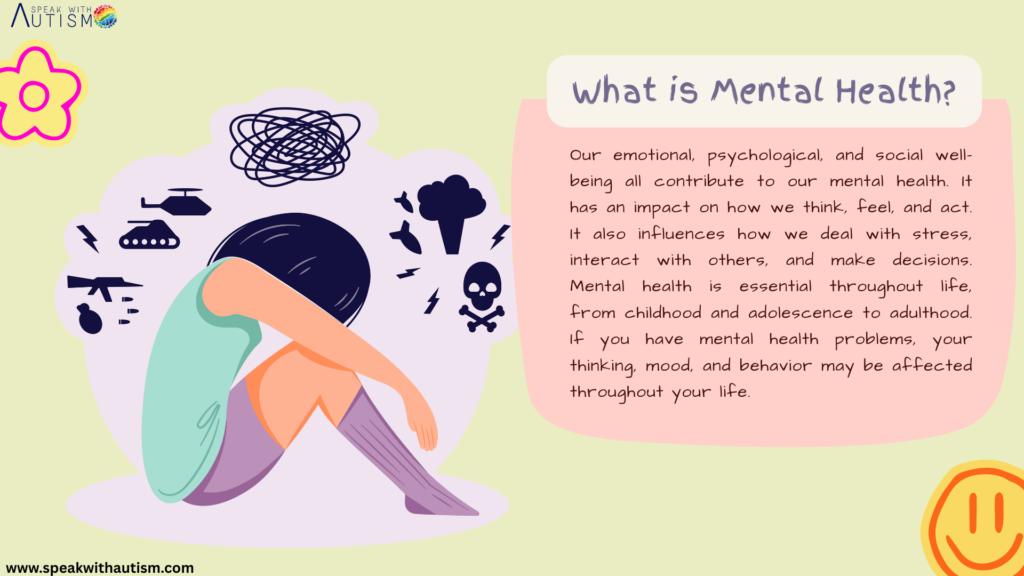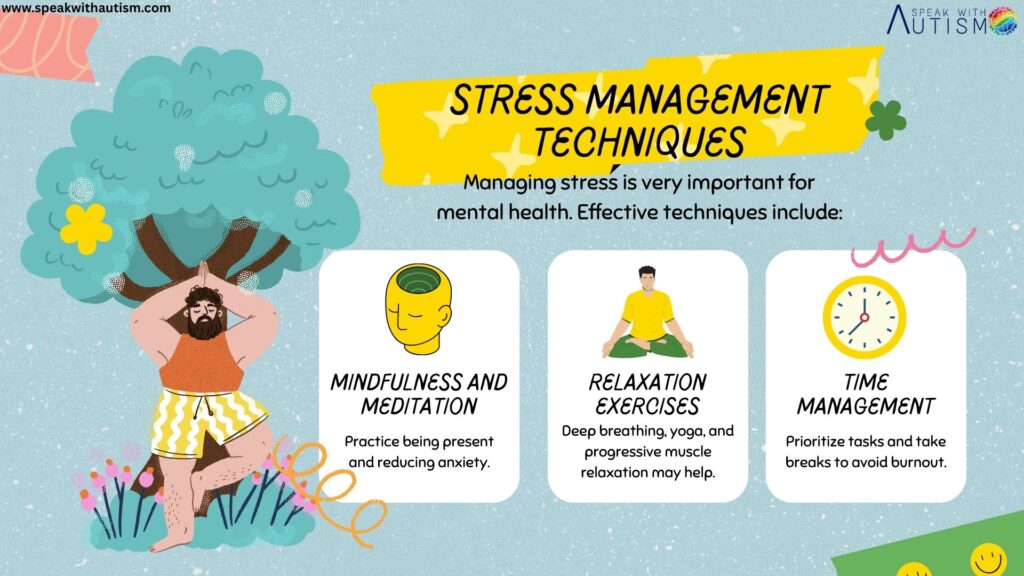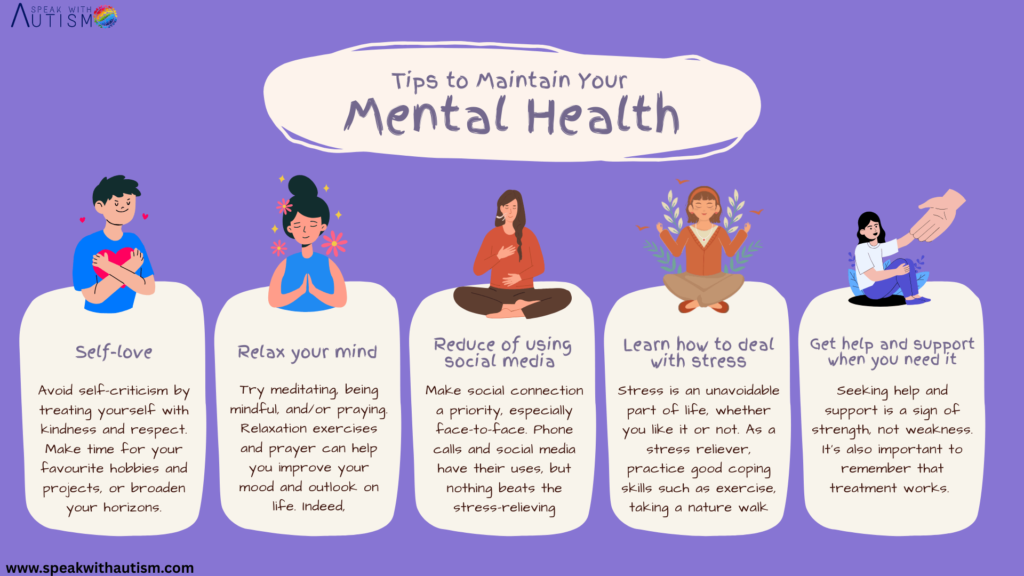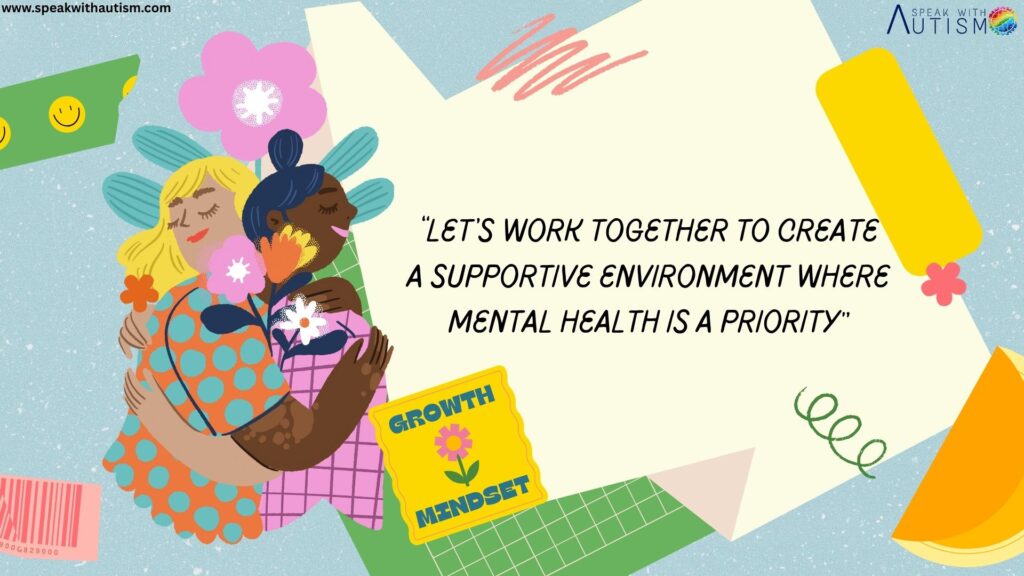Mental Health and Autism: Autism Spectrum Disorder (ASD) is a neurodevelopmental condition that shapes how a person communicates, interacts, and experiences the world. While autism itself is not a mental health disorder, many autistic individuals face mental health challenges that affect their daily lives. As a parent of an autistic child, I’ve seen firsthand how these struggles can make life feel so different, not just for my son, but for me too. I want to share this with other parents to raise awareness about what it’s really like and why mental health support matters.

Table of Contents
Why Mental Health Matters for Autistic Individuals
Autistic individuals often experience the world in unique ways—through sensory sensitivities, social differences, and distinct ways of thinking. These factors can contribute to stress, isolation, and anxiety in ways that others may not fully understand.
For my son, who is nonverbal, a simple trip to the store can feel overwhelming due to loud noises or bright lights. Research shows that autistic individuals are more prone to anxiety, depression, and conditions like ADHD. These challenges aren’t just “phases”—they are real obstacles that require attention and support.
,
Common Mental Health Challenges in Autism
Anxiety
- My son becomes anxious when his routine changes—like if I’m late picking him up from therapy. Since he cannot express his feelings through words, his anxiety often shows in clenched fists, repetitive movements, or increased restlessness. For autistic children, the world can feel unpredictable and overwhelming.
Depression
- It breaks my heart to see him struggle to connect with peers or feel excluded at school. Even though he cannot verbally express sadness, his withdrawal, lack of engagement, or changes in mood tell me that loneliness affects him deeply.
Sensory-Related Stress
- Loud sounds—like a vacuum cleaner, pressure cooker whistle—can trigger a meltdown. This isn’t a tantrum; it’s an overwhelming sensory reaction that takes time and support to manage.
Co-occurring Conditions
- ADHD makes it difficult for him to stay focused, adding another layer of challenge to his daily life—and mine as a parent.
A Parent’s Perspective: The Struggle of Small Steps
Raising my nonverbal autistic son has shown me how different his world is from what I once imagined. Tasks that come naturally to other children—like tying shoes, brushing teeth, or learning basic manners—can take months or even years of patient teaching.
Each small milestone feels like climbing a mountain. I’ve spent countless hours breaking tasks into tiny steps, repeating them endlessly, and celebrating even the smallest progress. But it’s not just my son who struggles—I do too. The exhaustion, the guilt when I lose patience, and the constant worry about his future weigh on me. And even though he cannot express it in words, I know he feels it too when he gets frustrated or shuts down because it’s all too much.
For autistic children, daily life isn’t simple. A crowded room isn’t just noisy—it’s overwhelming chaos. A new food isn’t just different—it’s a sensory shock. Parents, if you feel like you’re fighting a silent battle to help your child navigate this world, know that you are not alone. It’s hard for them, and it’s hard for us. But together, we keep moving forward—one step at a time.

Why These Challenges Happen
Social Gaps: My son wants to connect with others, but he doesn’t always know how. When his attempts are ignored or misunderstood, the rejection affects him deeply, and it hurts me too.
Masking: Sometimes, he tries to blend in by suppressing his natural behaviors, but this takes an emotional toll. Even though he doesn’t say it, I can see the exhaustion in his eyes.
Sensory Overload: What might be a minor irritation for others, like a buzzing light or a sudden loud noise, can be unbearable for him. A fire alarm, for example, can send him into a panic.
Misunderstanding: Many people don’t understand why he reacts the way he does. Their judgment and lack of awareness only add to his stress.
Strategies to Support Mental Health

Through trial and error, I’ve found ways to support both my son and myself:
- Routine
A predictable schedule helps him feel secure. Even small changes require preparation, or anxiety sets in. - Sensory Tools
Noise-canceling headphones have been a lifesaver during outings. At home, a quiet space allows him to recharge. - Patience with Progress
I’ve learned to celebrate the smallest victories, like when he brushed his teeth without resistance after months of practice. These moments keep us both motivated. - Therapy
Speech therapy and counseling have provided him with alternative ways to communicate, reducing his frustration—and mine. - Self-Care for Parents
I’ve realized that taking a break is necessary. We can’t support our children if we’re running on empty.
Breaking the Stigma
Mental health challenges aren’t a sign of failure—for our children or for us as parents. My son’s meltdowns aren’t “bad behavior,” and my tears aren’t weakness. They’re part of the journey.
Too often, autistic children don’t receive the help they need because people assume they’re “just fine” or “being difficult.”
I want parents to know: it’s okay to seek support for your child and yourself.
Moving Forward: A Call to Parents

Raising my son has shown me that autism and mental health are deeply connected in ways no textbook can fully explain. His journey—and mine—has taught me that even the smallest steps require immense effort.
To fellow parents, I say this: It’s okay to feel overwhelmed. It’s okay to ask for help. But most of all, it’s essential to see the world through your child’s eyes. They are not just surviving—they are teaching us what true strength looks like.
We need better support—therapies tailored to their needs, schools that embrace their differences, and communities that listen. By sharing our stories, we can bridge the gap between autism and mental health, ensuring that our children don’t just get by—they thrive.
Because every step, no matter how small, is a triumph worth celebrating.
Mental Health and Autism: Key Questions and Answers
Why does my autistic child seem so anxious even in small situations?
Autistic children, like my son, often feel the world more intensely. A “small” situation—like a sudden noise or a change in plans—can feel huge because their brains process sensory input and uncertainty differently. For my son, a barking dog isn’t just loud; it’s a jolt that throws off his whole day. Anxiety isn’t misbehavior—it’s their mind trying to cope. Giving them predictability and a safe way to retreat (like headphones) can help.
How can I tell if my child’s meltdowns are about mental health or just autism?
This is tricky—I’ve asked myself this too. Autism-related meltdowns often come from sensory overload or frustration, like when my son covers his ears during a noisy event. But if they’re more frequent, last longer, or come with signs like withdrawal or sadness—like when he stopped playing with his favorite trains for days—it might be a mental health signal. Watch for patterns and talk to a professional who understands autism.
As a parent, why do I feel so drained teaching my autistic child basic things?
I get it—teaching my son to button his shirt took months, and I’d end up in tears some days. It’s not just the time; it’s the emotional weight of breaking every step down, repeating endlessly, and wondering if he’ll ever get it. Autistic kids often need extra repetition and patience, which drains us because we’re not just teaching—we’re adapting our whole way of thinking. It’s okay to feel this; it’s part of the journey.
How can an autistic child express their feelings if they don’t talk much?
My son doesn’t always use words, but his actions speak—flapping hands when he’s excited or hiding under a blanket when he’s upset. We use picture cards at home; he points to “sad” or “mad” when he can’t say it. For some kids, art or toys work too. The key is finding their language—it’s there, just different—and giving them a safe way to share it.
Does my autistic child feel lonely even if they don’t show it?
Yes, they might—I’ve wondered this about my son. He plays alone a lot, but sometimes I catch him watching other kids with a quiet longing. Autistic kids can crave connection but struggle to make it happen. Loneliness doesn’t always look like tears; it might be silence or sticking to the same routine for comfort. Gentle encouragement, like playdates with understanding friends, can help.
Why does my child “mask” their autism, and is it bad for their mental health?
My son sometimes copies other kids to blend in—like forcing a smile when he’s uncomfortable. It’s called masking, and it’s his way of coping with a world that doesn’t always get him. But it’s exhausting—I see him crash afterward. Over time, it can build stress or anxiety because he’s hiding who he is. Letting them be themselves at home, where it’s safe, can ease that pressure.
How can I help my autistic child feel less overwhelmed every day?
I’ve learned with my son that small tweaks make a big difference. We keep a visual schedule so he knows what’s coming—no surprises. A quiet corner with his favorite blanket helps when the world gets too loud. And I let him take breaks—five minutes alone can reset him. It’s about knowing their limits and building a little calm into the chaos.
What should I do if I’m worried about my own mental health as a parent?
I’ve been there, feeling guilty for being tired or angry. Raising an autistic child is a marathon, and we carry so much worry, hope, and exhaustion. It’s not selfish to step back. I started talking to a counselor, and it helped me breathe again. Even a coffee break with a friend who listens can recharge you. If we’re okay, we can keep being there for them.
Can the community help my autistic child’s mental health?
Absolutely—community matters. When my son’s teacher learned his triggers and adjusted class noise levels, he smiled more. Neighbors who don’t judge his flapping hands make outings less stressful. Schools, friends, even strangers can lift their spirits by being patient and kind. It’s not just on us parents; it takes a village.
How do I explain to my autistic child that it’s okay to struggle?
With my son, I keep it simple. I say, “Everyone has hard days—even me. It’s okay to feel big things.” We draw faces—happy, sad, mad—and talk about them. He’s learning his feelings aren’t wrong, just part of him. For kids who don’t speak, a hug or a favorite toy can say it too. They need to know we’re with them, no matter what.
